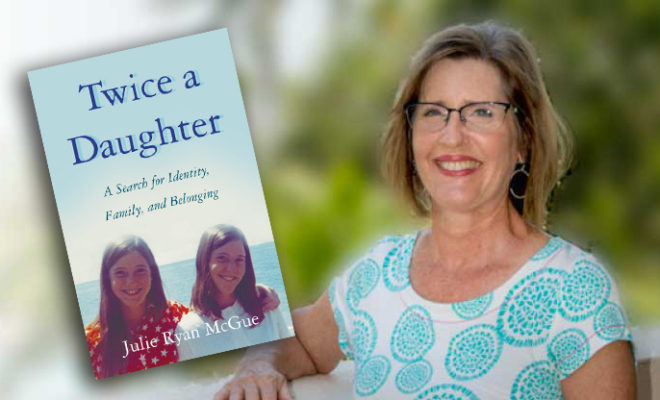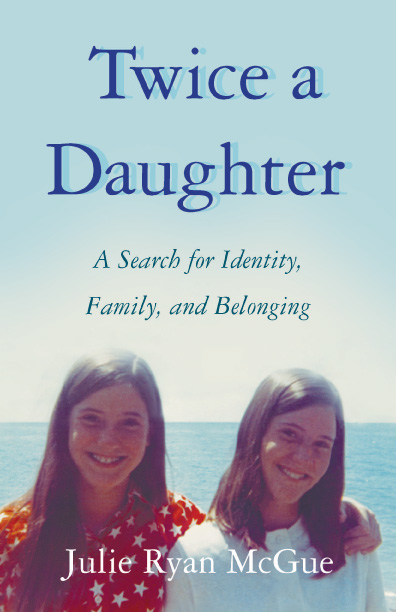
Literature
Literary Scene: Twice a Daughter
A behind-the-scenes look at Sarasota author Julie McGue’s debut memoir, Twice a Daughter
By Ryan G. Van Cleave | May 2021
Instead of offering our normal trio of book reviews, this month’s Literary Scene focuses on a local author whose debut book, Twice a Daughter: A Search for Identity, Family, and Belonging, is being published in May 2021 by She Writes Press.

Have you always considered yourself a writer?
I always kept a journal. I think I always felt that I had a book in me. But I raised four kids, and three of them played college sports. So, we were all over the place—I was following them around and participating. It kind of put writing on the back burner.
The adoption story was just a natural way to get back into something I would’ve gotten to. Eventually!
But this is your first book?
This memoir is my debut book, yes. Though I’ve been blogging for three years, so it’s not my first foray into the literary scene.
With a phrase like “literary scene,” this is clearly the right place for you to be! So, how did Twice a Daughter come about?
The book came about because I have a twin sister, and we were both adopted together. When I was in my late 40s, I had a suspicious mammogram and got sent for a biopsy. Up until that point, I played with the idea of looking for my birth parents but didn’t get anywhere because it was a closed adoption. There were all sorts of legal ramifications to trying to get at that. But the breast biopsy kind of said, “You can’t mess around with this. It’s time to figure out what your family medical history is.”
How did everyone accept that new plan?
My sister supported it, but my parents were lukewarm. My dad was great. My mom was not. She really didn’t expect at my age that I was going to do that.
How long did the search take?
The whole saga lasted five years. We ran into one obstacle after another.
What were some of those obstacles?
Not only was my adoptive mom unhappy that I was searching, but my birth mom didn’t want to be found. Plus, I still had this pressure of trying to figure out my medical history.
I ended up using both a search agency and a PI, then I connected with a confidential intermediary program which the state of Illinois instituted to help people like me. When the intermediary opened my closed adoption records and found my birth mom, it took her a while to change her mind.
“…it’s really important to understand how everybody fits together and try to appreciate the decisions that they make. Because if you don’t do that, you don’t give yourself the capability to forgive.”
You had some low points along the way, didn’t you?
At one point, my adoptive mom almost asked me to choose. I simply didn’t choose between my families because I felt that I should be able to have as many family members in my life as I wanted.
I agree completely. Now, what did you find most surprising about the process of writing the book?
My capacity to understand my birth mother’s experience as well as my adoptive mother’s point of view.
If you had to sum up the book’s message, it’d be that…
…it’s really important to understand how everybody fits together and try to appreciate the decisions that they make. Because if you don’t do that, you don’t give yourself the capability to forgive.
How did your own family react to the book?
I have three daughters and one son. They were like, “Oh, yeah, Mom’s trying to find her birth relatives.” You know teenagers—they’re not really that engaged with what their parents are doing. They kind of know and they kind of listen, but it’s not really meaningful to them.
Then I gave my son an advance reading copy of the book. When he was reading it, he started sobbing. He’s 31 years old! He’s a big football-player-sized kid. I asked, “Are you okay?” And he answered, “Mom, I just had no idea. You went through all this?”
It sounds like he had an important AHA moment there, which books can sometimes deliver in a way few other things can.
Absolutely.
What was your primary motivation for writing the book? And did it change over the course of doing it?
The first goal was to get the story on paper and get it out. But one of the things I did during the course of the search journey was enter a post-adoption support group through Catholic Charities. As I sat around the table with other members, I found that not only was my story a personal story, but it was also the story of so many others, too.
What’s the most important lesson that you learned over the course of writing Twice a Daughter?
That this was something I could get through. And that people can learn to be better listeners.
What was the most challenging aspect of writing a memoir?
What to leave in and what to leave out. There were a lot of stories that I would’ve liked to include, but the book would’ve probably been 600 pages, if that were the case. And so it was ultimately just about the search, and not about those other things, such as what it’s like to grow up as a twin and what it’s like to be an adoptee.
I guess that’s for the next memoir!



You must be logged in to post a comment Login